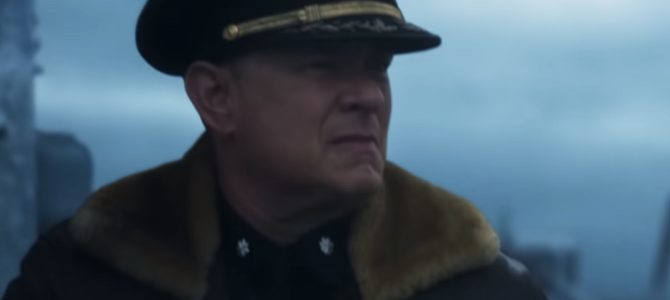
One of the greatest tours one can do in London is of the Imperial War Museums, a testament in photos, newsreels, and objects of a world hauntingly lost. There are not many from that era alive among us. For a time scale, thinking about the Second World War in 2020 is similar to thinking about the Napoleonic wars during the autumn of 1942.
Yet there’s rarely a feeling more powerful than what a student of war history might feel walking on the narrow decks of HMS Belfast moored next to the Tower Bridge on the Thames, imagining how it would have felt on a windy, wet night around 80 years back. No fictional horror will ever compare to surviving a slippery deck on a warship guarding supply convoys steaming from the Americas to Britain during a stormy mid-Atlantic night, hunted by German submarine wolf-packs.
Tom Hanks is the only person who could have made you feel that same feeling while transfixed on a screen, and he did. “Greyhound,” based on C.S. Forrester’s “The Good Shepherd” (1955), was supposed to release on the big screen but, as with everything this hell year, it was finally delayed and released on Apple TV streaming.
That is a tragedy, because this is perhaps one of the best movies on the Battle of the Atlantic. It is also a time, which, for some reason, does not have a lot of good cinematic depictions.
In any case, good naval war movies are rare. Modern war films fall in three categories: First, straightforward heroic “punching back after a knockdown” flicks, like “Pearl Harbor” and “Midway”; second, a heavy focus on human emotions, like “Hurt Locker” and “Dunkirk”; third, the classics.
Their heroes are men like you and I, our fathers and uncles, often middle-aged, tinged with bouts of self-doubt and enough stoic cynicism that comes with grey-haired temples and possibly early onset of mild rheumatism. The stories are often short time-spanned, not a grand tale of adventure, but of true heroism, clenched-teeth survival, and gritty endurance. “Master and Commander,” “The Hunt for Red October,” “The Guns of Navarone,” “The Cruel Sea,” and “Sink the Bismarck” are worthy predecessors to this particular rhetorical genre, to which “Greyhound” is a perfect addition.
“Greyhound” is the story of Captain Ernest Krause, a God-fearing, patriotic American on his first active convoy-escorting duty, to carry supplies, food, medicines, fuel, and weapons to the old world. His Fletcher-class destroyer, USS Keeling, whose call sign is Greyhound, is accompanied by two British warships and an American rescue ship, USS Cadena.
These four ships are guarding a convoy of around 40 supply ships and tankers from Canada and the United States. Without these daily supplies, Britain would starve, and the Nazis would take over all of Europe and the British Empire. That would, in turn, give them enough manpower and resources to dominate the entire world unchallenged.
Millions of soldiers, as well as British civilians, depended on these rations. There is, of course, a stretch of sea lacking direct air-cover from North American and Canadian bombers, and the Royal Airforce. And it is in that space, for a span of 36 hours, that German “wolf-pack” submarines hunt.
Krause is a character who once formed the backbone of civilization, and still in some ways does. He is haunted by self-doubts. He prays twice a day. He forgets to eat during pressure. He is reserved about showing emotions in public, as that is uncivilized for a man. He cares about his crewmen and sailors like his children but often cannot express that in words.
His sailors, also of the same generation, revere and trust him like their father, even when they have gnawing doubts about his experience. But most importantly, he is non-ideological enough to understand that the claustrophobic Germans finding an abyssal grave are also fathers, husbands, and sons grinding in the cruel cycle of fate.
Great power competitions happen due to structural reasons, and those men who are unfortunate enough to be born in times of epochal change have to man up and walk forward for faith, flag, and family. It is what makes Forrester’s books so great, and it is something our leaders used to know, even during the Cold War.
The millions of average Russians, Germans, Australians, British, Indians, Canadians, and Americans are just that — average men, responding to a greater call to sacrifice. Most barely comprehend the circles of History, nor are capable of changing it. That’s what made our forefathers humble and stoic.
To see that depicted is anachronistic in an era when nothing other than feelings and grievances are deemed important. There’s no greater unifying cause than to fight for your flag in an existential, multipolar great-power war in which your very way of life is on the line. Without a unifying national narrative, society crumbles into tribes, and are vulnerable to charlatans and subversives.
There are some cinematic mistakes. Warships do not fire full broadsides when another friendly warship is on the line; every single ship and every single soul counts, and there’s no scope for mistakes or bravado like that.
German submarines usually avoided going into the middle of a convoy, because any submariner would be worried about being circled and depth-charged to oblivion, so they usually sniped from the outer rims and fled.
After the sinking of the greatest German battleship, Bismarck, there was no more German surface challenge to the Royal and U.S. navies, and subs were there to do maximum damage to the supply lines, not take part in a shooting war with the far superior Anglo-American surface fleets.
The entire plotline with Elisabeth Shue is understandable, but could have been avoided. “Master and Commander” had no female cameos or roles, and it is still the greatest naval war film ever made.
Nevertheless, “Greyhound” is a gorgeous cinematic experience, a story well told, of a time that is still formative for our modern era, and of men, the likes of whom are sadly diminishing every single day. It may get terrible reviews; modern movie reviewers will not understand anything about this unless human emotions are force-fed.
But normal people will like it, because they will be able to identify with the characters here. If, God forbid, our world reaches another hinge point of History, they will be the ones to rise up as the silent heroes of such stories.









